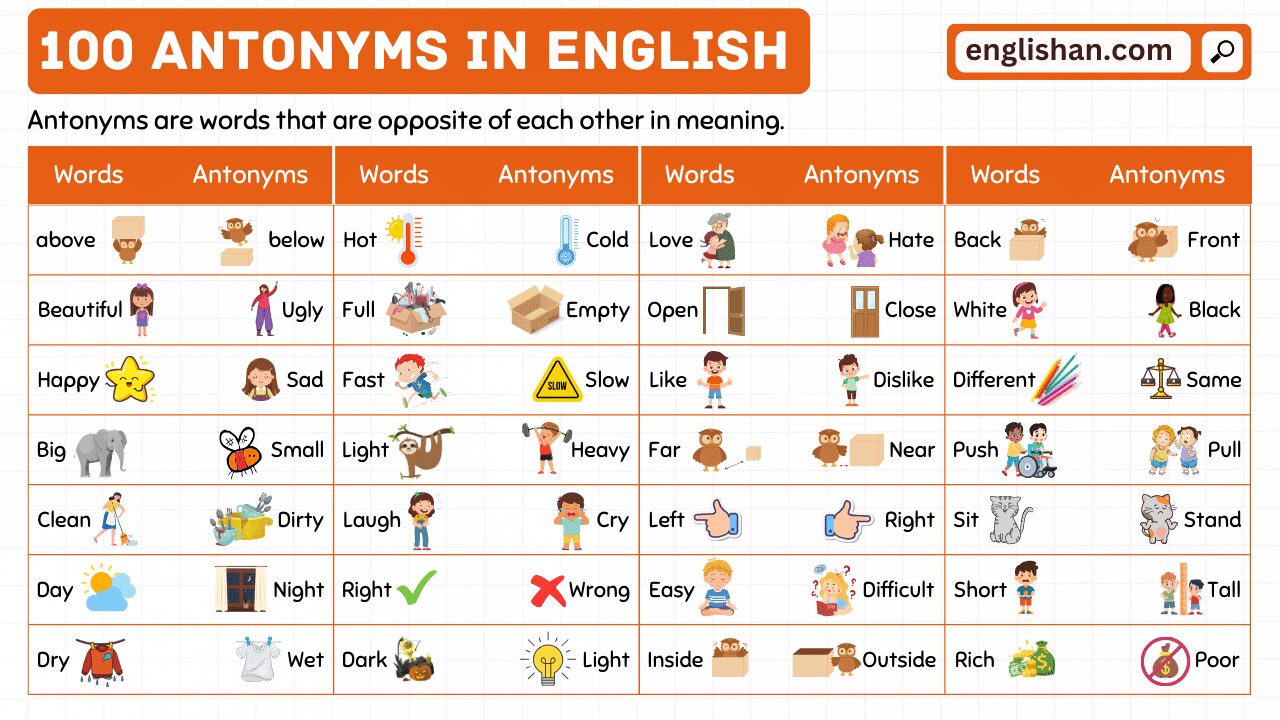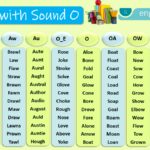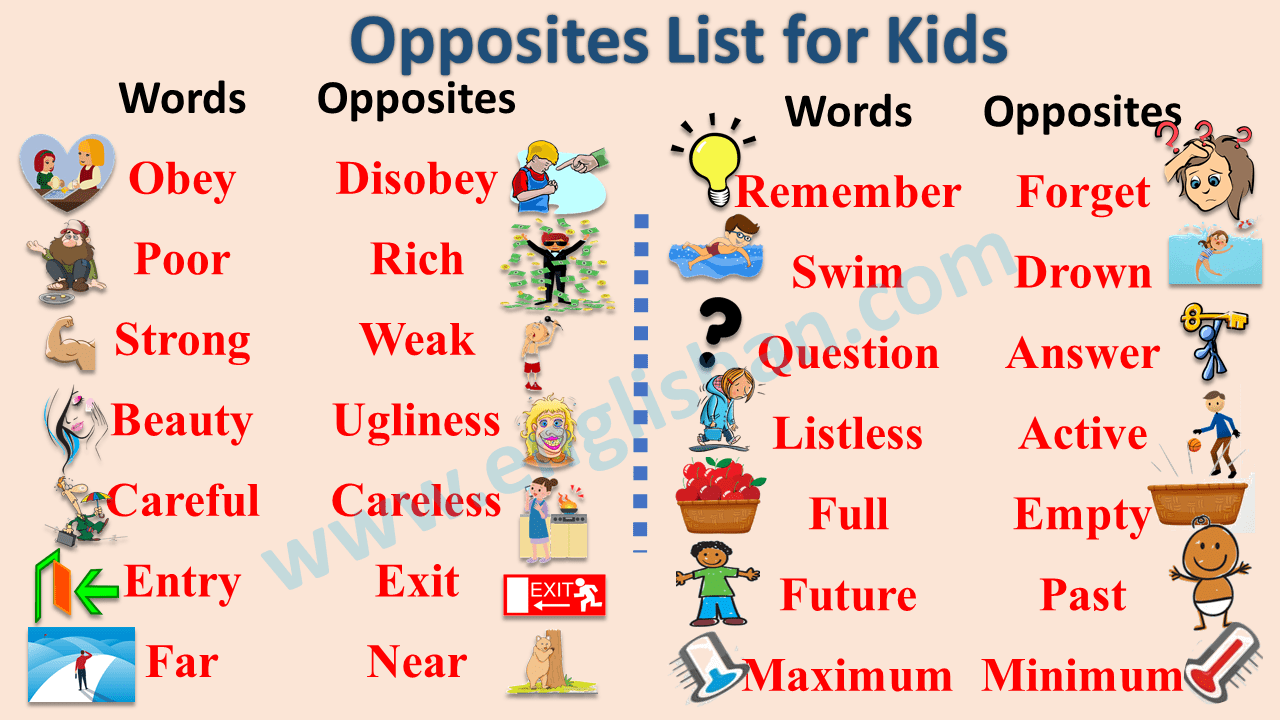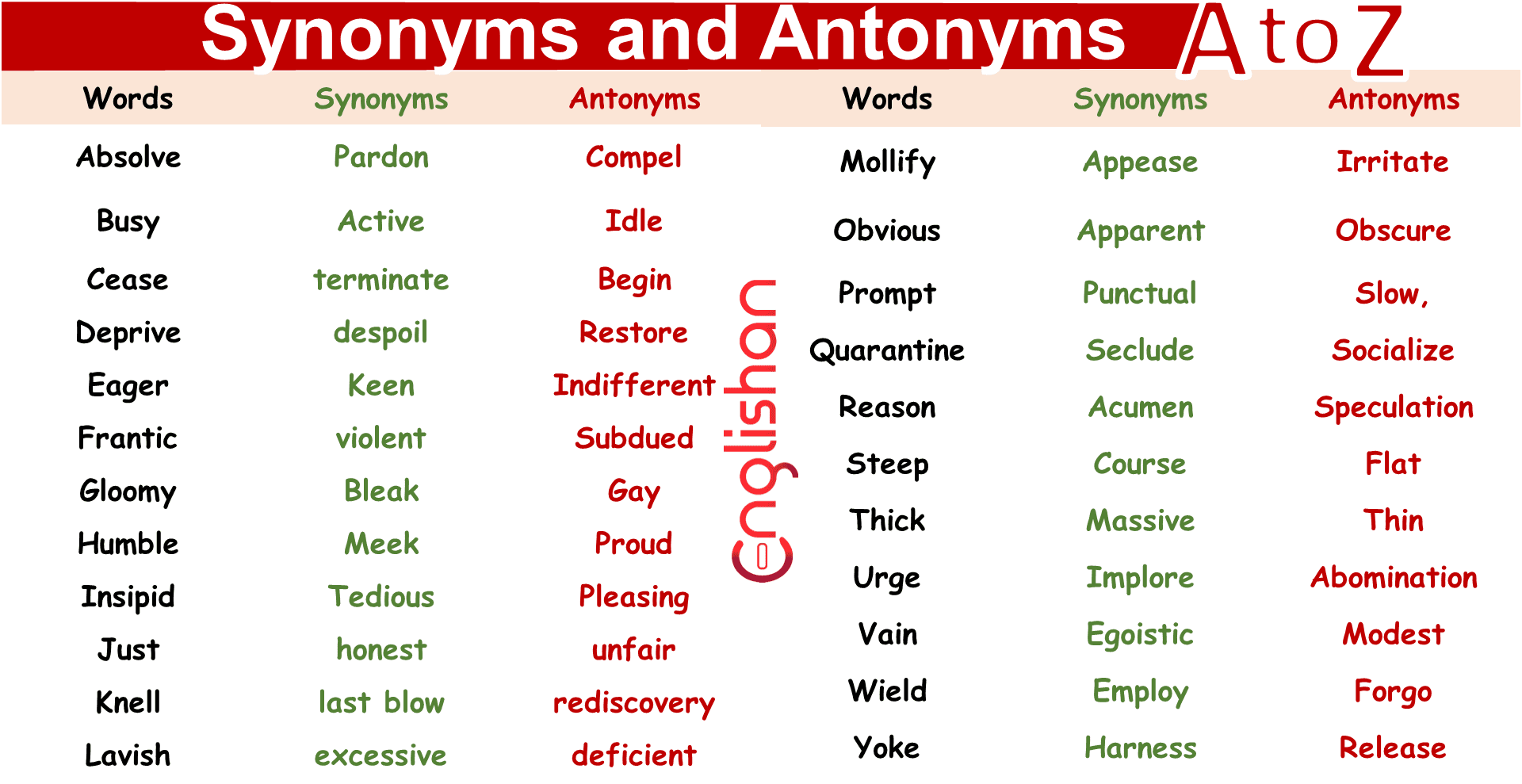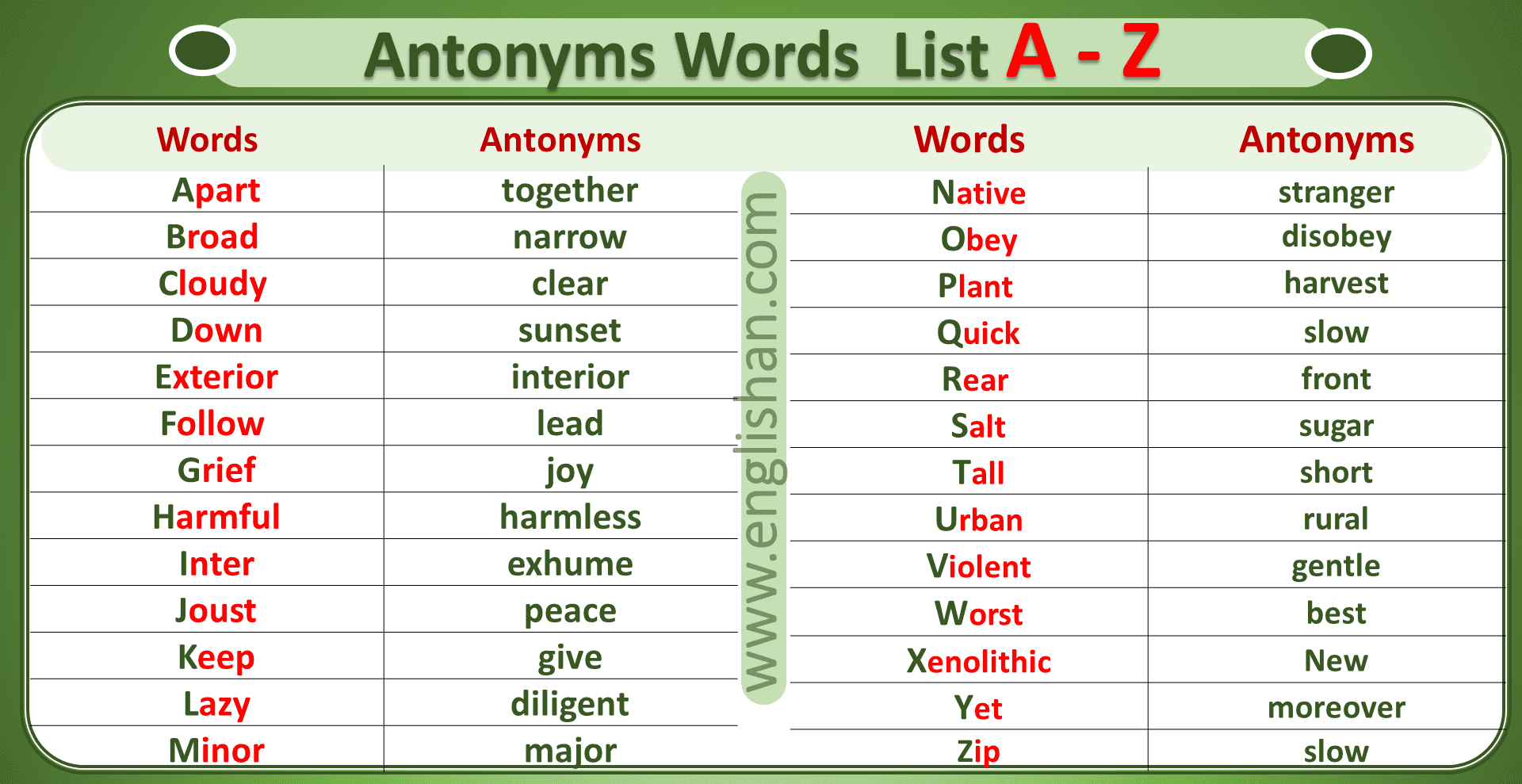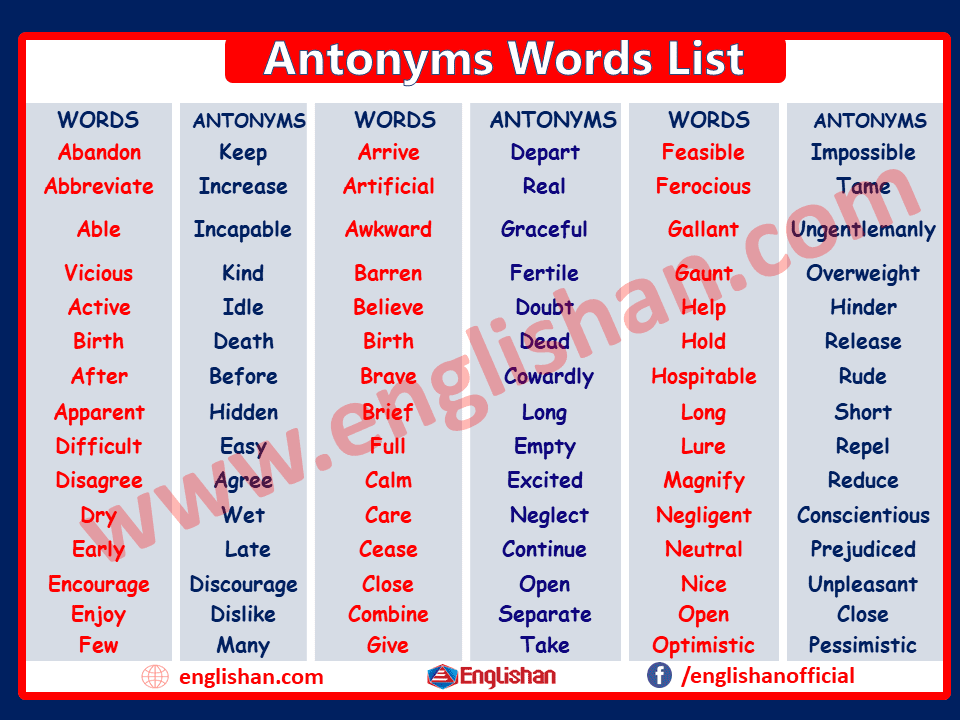Antonyms are words that have opposite meanings. They help us understand the meanings of words by showing us their opposite meanings. For example, “fast” and “slow” are antonyms because one word means moving quickly and the other means moving slowly. In this article, we will learn 100 antonyms in English with examples to help you expand your vocabulary and improve your communication skills. Let’s get started!
100 Common Antonyms in English
| No. | Word | Antonym |
|---|---|---|
| 1 | Above | Below |
| 2 | Active | Inactive |
| 3 | Add | Subtract |
| 4 | Alive | Dead |
| 5 | Always | Never |
| 6 | Arrival | Departure |
| 7 | Beautiful | Ugly |
| 8 | Begin | End |
| 9 | Big | Small |
| 10 | Black | White |
| 11 | Brave | Cowardly |
| 12 | Bright | Dim |
| 13 | Cheap | Expensive |
| 14 | Clean | Dirty |
| 15 | Closed | Open |
| 16 | Cold | Hot |
| 17 | Come | Go |
| 18 | Day | Night |
| 19 | Difficult | Easy |
| 20 | Dry | Wet |
| 21 | Early | Late |
| 22 | Empty | Full |
| 23 | Fast | Slow |
| 24 | Few | Many |
| 25 | Front | Back |
| 26 | Good | Bad |
| 27 | Happy | Sad |
| 28 | Hard | Soft |
| 29 | Heavy | Light |
| 30 | High | Low |
| 31 | Hot | Cold |
| 32 | In | Out |
| 33 | Increase | Decrease |
| 34 | Inside | Outside |
| 35 | Joy | Sorrow |
| 36 | Knowledge | Ignorance |
| 37 | Laugh | Cry |
| 38 | Left | Right |
| 39 | Light | Dark |
| 40 | Like | Dislike |
| 41 | Little | Big |
| 42 | Long | Short |
| 43 | Love | Hate |
| 44 | Male | Female |
| 45 | Defend | Attack |
| 46 | Near | Far |
| 47 | New | Old |
| 48 | Open | Close |
| 49 | Over | Under |
| 50 | Peace | War |
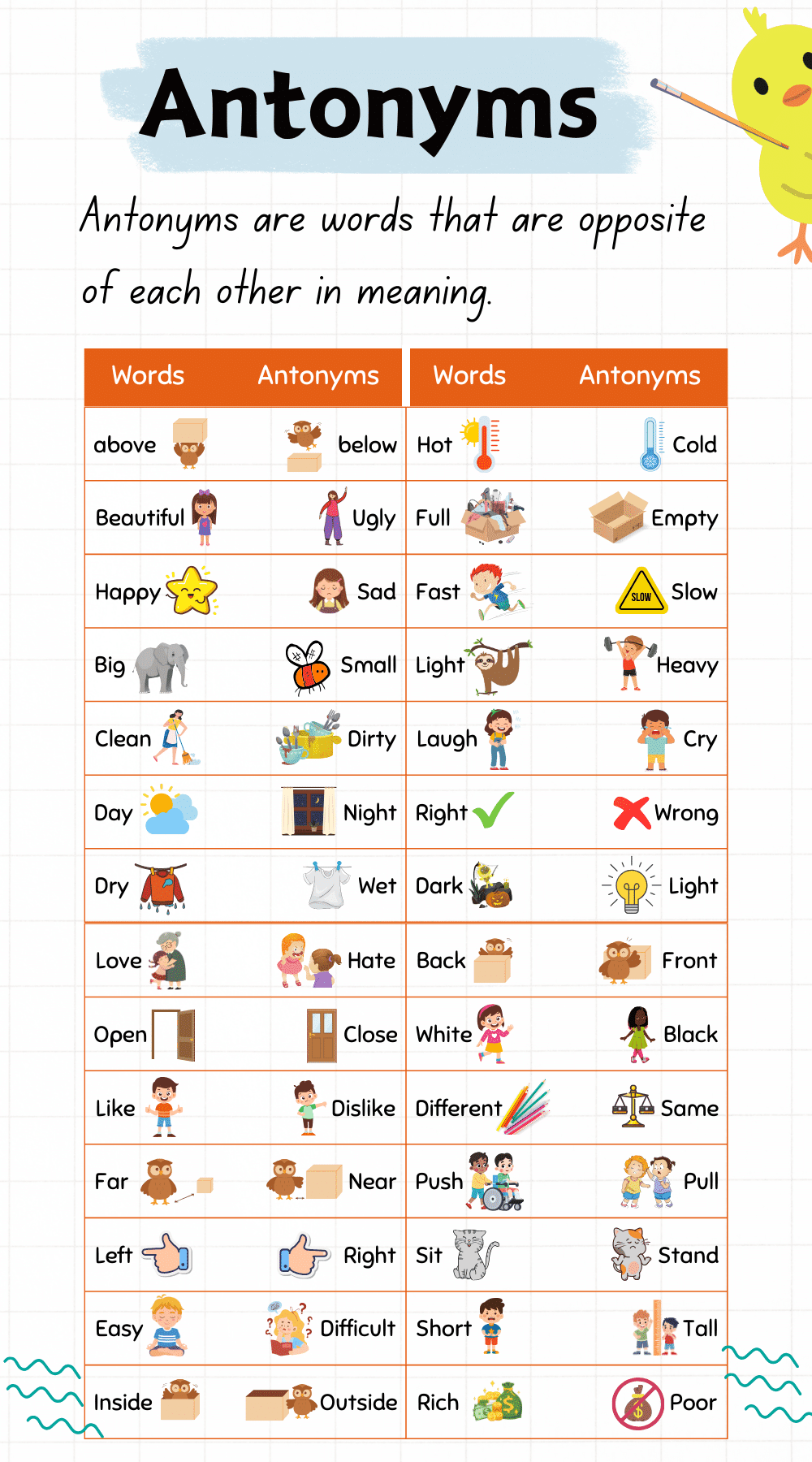
| No. | Word | Antonym |
|---|---|---|
| 51 | Poor | Rich |
| 52 | Positive | Negative |
| 53 | Push | Pull |
| 54 | Question | Answer |
| 55 | Quiet | Loud |
| 56 | Raise | Lower |
| 57 | Rare | Common |
| 58 | Right | Wrong |
| 59 | Rise | Fall |
| 60 | Safe | Dangerous |
| 61 | Same | Different |
| 62 | Save | Spend |
| 63 | Short | Tall |
| 64 | Simple | Complex |
| 65 | Sister | Brother |
| 66 | Sit | Stand |
| 67 | Small | Large |
| 68 | Temporary | Permanent |
| 69 | Start | Finish |
| 70 | Strong | Weak |
| 71 | Success | Failure |
| 72 | Truth | Lie |
| 73 | True | False |
| 74 | Tight | Loose |
| 75 | Teach | Learn |
| 76 | Up | Down |
| 77 | Victory | Defeat |
| 78 | Visible | Invisible |
| 79 | Sweet | Sour, Bitter |
| 80 | Think | Ignore |
| 81 | Tense | Relaxed |
| 82 | Terrible | Wonderful |
| 83 | Understand | Misunderstand |
| 84 | Win | Lose |
| 85 | Wise | Foolish |
| 86 | Cruel | Kind |
| 87 | Young | Old |
| 88 | Zigzag | Straight |
| 89 | Well | Ill |
| 90 | Borrow | Lend |
| 91 | Conquer | Surrender |
| 92 | Top | Bottom |
| 93 | Upset | Pleased |
| 94 | Upper | Lower |
| 95 | Useful | Useless |
| 96 | Urban | Rural |
| 97 | Urgent | Not Urgent |
| 98 | Allow | Forbid |
| 99 | Create | Destroy |
| 100 | Sudden | Gradual |
Antonyms Used in Sentences
Here are 100 basic antonyms in English with example sentences:
- Above/Below:
- Above: The sky is above us.
- Below: The shoes are below the bed.
- Active/Inactive:
- Active: Sarah is active in sports.
- Inactive: He is inactive during the meeting.
- Add/Subtract:
- Add: Please add sugar to the tea.
- Subtract: Can you subtract 5 from 10?
- Alive/Dead:
- Alive: The cat is alive.
- Dead: The flowers are dead.
- Always/Never:
- Always: I always start my day with coffee.
- Never: He never eats spicy food.
- Arrival/Departure:
- Arrival: The arrival of the train is delayed.
- Departure: The departure time is 3:00 PM.
- Beautiful/Ugly:
- Beautiful: She has a beautiful smile.
- Ugly: The old building is ugly.
- Begin/End:
- Begin: Let’s begin the game.
- End: The story will end soon.
- Big/Small:
- Big: Elephants are big animals.
- Small: Ants are small insects.
- Black/White:
- Black: Her cat is black.
- White: The snow is white.
- Brave/Cowardly:
- Brave: He is brave in facing challenges.
- Cowardly: The timid rabbit is cowardly.
- Bright/Dim:
- Bright: The sun is bright today.
- Dim: The lamp gives a dim light.
- Cheap/Expensive:
- Cheap: The shirt is cheap on sale.
- Expensive: The car is expensive.
- Clean/Dirty:
- Clean: The kitchen is clean.
- Dirty: The shoes are dirty.
- Closed/Open:
- Closed: The door is closed.
- Open: Please leave the door open.
- Cold/Hot:
- Cold: Ice cream is cold.
- Hot: Coffee is hot.
- Come/Go:
- Come: Please come to the party.
- Go: Don’t go too far.
- Day/Night:
- Day: The day is sunny.
- Night: The night is dark.
- Difficult/Easy:
- Difficult: The exam was difficult.
- Easy: Drawing is easy for her.
- Dry/Wet:
- Dry: The towel is dry.
- Wet: The umbrella is wet.
- Early/Late:
- Early: We woke up early today.
- Late: The bus is running late.
- Empty/Full:
- Empty: The glass is empty.
- Full: The cup is full of coffee.
- Fast/Slow:
- Fast: The car is fast.
- Slow: Turtles move slowly.
- Few/Many:
- Few: I have a few friends.
- Many: There are many stars in the sky.
- Front/Back:
- Front: Please stand in front.
- Back: The book is on the back shelf.
- Good/Bad:
- Good: Apples are good for health.
- Bad: Smoking is bad for health.
- Happy/Sad:
- Happy: She looks happy.
- Sad: He seems sad.
- Hard/Soft:
- Hard: The rocks are hard.
- Soft: The pillow is soft.
- Heavy/Light:
- Heavy: The bag is heavy.
- Light: The feather is light.
- High/Low:
- High: The airplane is flying high.
- Low: The temperature is low in winter.
- Hot/Cold:
- Hot: The coffee is hot.
- Cold: Ice cream is cold.
- In/Out:
- In: Put the keys in the drawer.
- Out: The cat is out of the house.
- Increase/Decrease:
- Increase: Prices increase over time.
- Decrease: Temperatures decrease in winter.
- Inside/Outside:
- Inside: We are inside the house.
- Outside: The kids are playing outside.
- Joy/Sorrow:
- Joy: Winning brings joy.
- Sorrow: His face shows sorrow.
- Knowledge/Ignorance:
- Knowledge: Reading books gives knowledge.
- Ignorance: Ignorance leads to mistakes.
- Laugh/Cry:
- Laugh: We laugh at funny jokes.
- Cry: Babies cry when they’re hungry.
- Left/Right:
- Left: Turn left at the corner.
- Right: The store is on the right.
- Light/Dark:
- Light: The room is bright with light.
- Dark: Night brings darkness.
- Like/Dislike:
- Like: I like chocolate.
- Dislike: I dislike waking up early.
- Little/Big:
- Little: The kitten is little.
- Big: The elephant is big.
- Long/Short:
- Long: The river is long.
- Short: The pencil is short.
- Love/Hate:
- Love: They love each other.
- Hate: We should not hate anyone.
- Male/Female:
- Male: Lions are male.
- Female: Tigers are female.
- Defend/Attack:
- Defend: Soldiers defend the country.
- Attack: The army will attack at dawn.
- Near/Far:
- Near: The park is near our house.
- Far: The mountains are far.
- New/Old:
- New: I bought a new car.
- Old: The book is old.
- Open/Close:
- Open: Keep the door open.
- Close: The window is close to me.
- Over/Under:
- Over: The rainbow is over there.
- Under: The cat is under the table.
- Peace/War:
- Peace: We all want peace.
- War: War brings destruction. – Great You have learned 50 Antonyms in English, Let’s Continue!!!
- Poor/Rich:
- Poor: The beggar is poor.
- Rich: The businessman is rich.
- Positive/Negative:
- Positive: Stay positive in tough times.
- Negative: Negative thoughts bring sadness.
- Push/Pull:
- Push: Push the door to open it.
- Pull: Pull the handle to close it.
- Question/Answer:
- Question: Ask a question in class.
- Answer: She knows the answer.
- Quiet/Loud:
- Quiet: The library is quiet.
- Loud: The concert is loud.
- Raise/Lower:
- Raise: Raise your hand to speak.
- Lower: Lower the volume.
- Rare/Common:
- Rare: Diamonds are rare.
- Common: Stones are common.
- Right/Wrong:
- Right: 2 + 2 equals 4, that’s right.
- Wrong: Saying 2 + 2 equals 5 is wrong.
- Rise/Fall:
- Rise: The sun will rise.
- Fall: Leaves fall in autumn.
- Safe/Dangerous:
- Safe: The locker is safe.
- Dangerous: Fire is dangerous.
- Same/Different:
- Same: We have the same shoes.
- Different: Our tastes are different.
- Save/Spend:
- Save: Save money for the future.
- Spend: Don’t spend too much.
- Short/Tall:
- Short: The girl is short.
- Tall: The boy is tall.
- Simple/Complex:
- Simple: The task is simple.
- Complex: The problem is complex.
- Sister/Brother:
- Sister: She is my sister.
- Brother: He is my brother.
- Sit/Stand:
- Sit: Sit on the chair.
- Stand: Stand up straight.
- Small/Large:
- Small: The phone is small.
- Large: The car is large.
- Temporary/Permanent:
- Temporary: This job is temporary.
- Permanent: The position is permanent.
- Start/Finish:
- Start: Let’s start the race.
- Finish: Cross the finish line.
- Strong/Weak:
- Strong: The athlete is strong.
- Weak: The old bridge is weak.
- Success/Failure:
- Success: Hard work leads to success.
- Failure: Failure teaches us lessons.
- Truth/Lie:
- Truth: Always tell the truth.
- Lie: Lying is not acceptable.
- True/False:
- True: The statement is true.
- False: The information is false.
- Tight/Loose:
- Tight: The knot is tight.
- Loose: The shirt is loose.
- Teach/Learn:
- Teach: Teachers teach students.
- Learn: Students learn from teachers.
- Up/Down:
- Up: Look up at the sky.
- Down: Sit down on the chair.
- Victory/Defeat:
- Victory: The team celebrated their victory.
- Defeat: They accepted defeat gracefully.
- Visible/Invisible:
- Visible: The stars are visible at night.
- Invisible: The wind is invisible.
- Sweet/Sour, Bitter:
- Sweet: Chocolate is sweet.
- Sour: Lemons taste sour.
- Think/Ignore:
- Think: Take time to think.
- Ignore: Don’t ignore good advice.
- Tense/Relaxed:
- Tense: The situation is tense.
- Relaxed: Sundays are relaxed.
- Terrible/Wonderful:
- Terrible: The storm was terrible.
- Wonderful: The sunrise is wonderful.
- Understand/Misunderstand:
- Understand: I understand your point.
- Misunderstand: Don’t misunderstand my words.
- Win/Lose:
- Win: The team will win.
- Lose: Losing is part of the game.
- Wise/Foolish:
- Wise: Wise decisions lead to success.
- Foolish: Foolish actions have consequences.
- Cruel/Kind:
- Cruel: Being cruel is not acceptable.
- Kind: Helping others is kind.
- Young/Old:
- Young: The child is young.
- Old: The tree is old.
- Zigzag/Straight:
- Zigzag: The road goes in a zigzag.
- Straight: It is a straight way.
- Well/Ill:
- Well: She is feeling well today.
- Ill: He is ill and needs rest.
- Borrow/Lend:
- Borrow: Can I borrow your pen?
- Lend: Sure, I can lend it to you.
- Conquer/Surrender:
- Conquer: Conquer your fears.
- Surrender: Sometimes it’s wise to surrender.
- Top/Bottom:
- Top: The cherry is on top.
- Bottom: Look at the bottom shelf.
- Upset/Pleased:
- Upset: Don’t be upset about it.
- Pleased: She is pleased with the result.
- Upper/Lower:
- Upper: The upper floor has bedrooms.
- Lower: The lower step is broken.
- Useful/Useless:
- Useful: This tool is very useful.
- Useless: The broken phone is useless.
- Urban/Rural:
- Urban: The city is urban.
- Rural: The village is rural.
- Urgent/Not Urgent:
- Urgent: The task is urgent.
- Not Urgent: The matter is not urgent.
- Allow/Forbid:
- Allow: Allow them to enter.
- Forbid: Forbid them from leaving.
- Create/Destroy:
- Create: Artists create beautiful paintings.
- Destroy: Wars can destroy everything.
- Sudden/Gradual:
- Sudden: His arrival was sudden.
- Gradual: The colors changed gradually.
Antonyms in English Exercises with Answers
Choose the correct antonym (opposite word) from the options provided.
- The opposite of “happy” is:
- Sad
- Angry
- Excited
- Confused
- Choose the antonym for “big”:
- Small
- Large
- Tiny
- Huge
- What is the opposite of “hot”?
- Cold
- Warm
- Boiling
- Burning
- Find the antonym for “fast”:
- Quick
- Slow
- Rapid
- Speedy
- The antonym for “rich” is:
- Wealthy
- Poor
- Affluent
- Prosperous
- Choose the opposite of “old”:
- New
- Ancient
- Vintage
- Aged
- What is the antonym for “dark”?
- Dim
- Shadowy
- Bright
- Dull
- Find the opposite of “beautiful”:
- Pretty
- Ugly
- Attractive
- Gorgeous
- The antonym for “soft” is:
- Hard
- Tender
- Smooth
- Cushioned
- What is the opposite of “clean”?
- Dirty
- Tidy
- Neat
- Spotless
Answer Key:
- a) Sad
- a) Small
- a) Cold
- b) Slow
- b) Poor
- a) New
- c) Bright
- b) Ugly
- a) Hard
- a) Dirty
FAQs
Antonyms are words that have opposite meanings. They help us understand contrasts and add variety to writing and speech.
For example:Happy and Sad are antonyms as they show opposite emotions.
Here are 10 simple examples of antonyms:
1. Big / Small: Big means large, small means tiny.
2. Happy / Sad: Happy means feeling good, sad means feeling bad.
3. Hot / Cold: Hot means very warm, cold means very cool.
4. Fast / Slow: Fast means quick, slow means not quick.
5. Light / Dark: Light means bright, dark means no light.
6. Easy / Hard: Easy means simple, hard means not simple.
7. Clean / Dirty: Clean means not messy, dirty means messy.
8. Strong / Weak: Strong means powerful, weak means not powerful.
9. Good / Bad: Good means nice, bad means not nice.
10. Up / Down: Up means higher, down means lower.
Here are 10 examples of synonyms and antonyms:
1. Beautiful
Synonym: Pretty
Antonym: Ugly
2. Begin
Synonym: Start
Antonym: End
3. Rich
Synonym: Wealthy
Antonym: Poor
4. Cold
Synonym: Chilly
Antonym: Hot
5. Hard
Synonym: Difficult
Antonym: Easy
6. Quiet
Synonym: Silent
Antonym: Loud
7. Old
Synonym: Ancient
Antonym: New
8. Happy
Synonym: Cheerful
Antonym: Angry
9. Quick
Synonym: Swift
Antonym: Slow
10. Soft
Synonym: Gentle
Antonym: Hard
Here are 6 antonyms with sentences:
1. Big / Small
The elephant is big, but the mouse is small.
2. Happy / Sad
She was happy to win the game, but he felt sad about losing.
3. Hot / Cold
The soup is hot, but the ice cream is cold.
4. Fast / Slow
Cheetahs are fast, but turtles are slow.
5. Clean / Dirty
Her room is clean, but his desk is dirty.
6. Strong / Weak
The weightlifter is strong, but the baby is weak.
Here are 5 examples of antonyms:
1. Big / Small
2. Happy / Sad
3. Hot / Cold
4. Fast / Slow
5. Clean / Dirty
These are pairs of words with opposite meanings.
Check Your Understanding by Solving Antonyms Worksheets
You May Also Like
